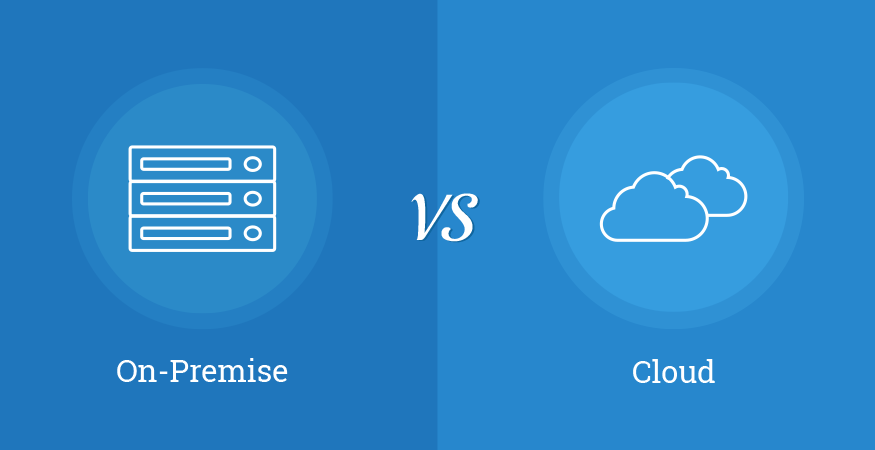Cloud ERP vs On-premise ERP: Solving The Great Business Debate
29 Aug 2017 | by Brett Mundell
Cloud ERP vs On-Premise ERP, which is the better option for my business?
As we have learned from many years of implementing such solutions, there is no single right or wrong answer to the Cloud vs On-Premise debate for Enterprise Resource Planning systems.
We have implemented Cloud, Hosted, Private Cloud and On-Premise solutions since 2005, and we want to help organisations better understand the pros and cons of each solution. Much has been written about the benefits of Cloud vs On-Premises, and we want to give our own view with particular focus on ERP systems.
This blog has been written to help educate organisations on some of the questions to ask that might help you with your Cloud ERP vs On-Premise ERP systems dilemma.
Why Cloud is becoming the new normal
There has been very strong acceptance of Cloud-based solutions for CRM (Customer Relationship Management), Office automation (Microsoft Office 365) and mobility tools.
The acceptance of ERP solutions in the cloud has been a little slower. Why?
Because potential cloud-based Enterprise Resource Planning adopters have been concerned about data, privacy and security.
There was a mindset that said, “I don’t want my debtors’ book exposed to the internet/cloud.” Most of that anxiety has gone away over the past few years as businesses have increased their uptake of cloud-based ERP solutions.
Companies have realised that their cloud deployment is no more or less exposed to the outside world than an on-premise solution (with remote connectivity).
As a result of these changes, most companies evaluating ERP solutions will be considering cloud and on-premise as deployment options.
The question that we are often asked is “Which is the best option for my business? Cloud ERP or on-premise ERP?”.
The Cloud ERP vs On-Premise ERP decision comes down to this
Before deciding which is the correct option for your business, ask yourself these questions:
Cash flow – Am I more comfortable with an upfront investment or monthly payments? Not having to outlay large sums of money upfront for software, hardware, and infrastructure helps ease some cash flow pains. One cautionary note – paying for cloud software and services is an ongoing commitment, monthly or annually, for the lifetime of the software. This is an important aspect to consider when evaluating the target ERP Return on investment for your business.
Internet – Like it or not, any Cloud-based solution that you use will require fast, reliable internet. If you can’t get a fast, reliable internet connection, then an On-premise solution is for you.
Geography – Remote offices can sometimes struggle for a decent internet connection. Multiple geographies and different office locations do, however, lend themselves to a cloud deployment. One of the major advantages of Cloud ERP is that you can add new users, offices and sites with ease. Tell your Cloud provider you need additional users and you are immediately up and running – no server, infrastructure or hardware configuration required.
Infrastructure – An on-premises solution requires hardware, routers, backup solutions and infrastructure. With a Cloud-based ERP solution, the infrastructure is taken care of and is constantly updated.
Tax – The treatment for tax purposes of an upfront software purchase (asset) is usually quite different to the tax treatment of monthly “operating cost” invoices for the Cloud. Consult your external accountants or tax advisors for more information in this regard.
Capex vs Opex – As detailed in the tax section above. As a business, you will need to decide whether the Capex (asset purchase model) or the Opex (monthly pay-as-you-go) is better suited to your business. Factors like cash flow, depreciation deductions, balance sheet review, and investor perception should all be considered.
Functional requirements – Yes, even your functional requirements should be part of the Cloud ERP vs On-Premise ERP debate. Cloud lends itself to faster, easier deployment of ERP solutions. If you have extensive integration and development requirements, your business might be better suited to an On-Premise ERP deployment. At the very least, if you have complex functional requirements and you are planning a true Cloud deployment of ERP, ask your ERP vendor or reseller how upgrades will work to ensure continuity of service during a generic Cloud upgrade across a highly customised solution. I am not suggesting that Cloud-based ERP solutions can’t be customised – quite the opposite. True Cloud solutions tend to use the latest technology across operating systems, databases and mobility. As a result, Cloud-based ERP solutions tend to be easily customizable. The challenge is when you have extensive development and integration (see note below).
Development and integration – The nature and scope of your development and integration work should be considered. A true Cloud solution lends itself to a standard ERP implementation (the less development and integration required, the better). Standardisation and repeatability are key for a true Cloud solution. The more standard the solution, the easier the rollout and the less disruptive the standard solution updates and upgrades.
Users – The number of users and the pace at which you add (or deduct) users should be considered. Cloud solutions lend themselves to the ability to easily and quickly add or deduct users from the solution – the true “pay as you go” model.
3rd party solutions – If you want to add 3rd party solutions to your Cloud deployment of ERP solutions, you will need to ensure that these 3rd party solutions are available in the Cloud and are compatible with your Cloud deployment of your chosen ERP solution.
ERP Upgrades – In a true Cloud environment, the ERP Cloud provider takes care of all upgrades. The Cloud provider does a staged or full upgrade to all systems at a certain time.
[Why on-premises ERP solutions are moving to the cloud]
Conclusion
After having implemented ERP solutions for many years, we have learned that the On-Premise ERP vs Cloud ERP decision comes down to an understanding of your specific business requirements and propensity to adopt two distinct technology adoption models.
On one side, you have your monthly ongoing “pay as you go” model, the Cloud ERP option. Here, the reduced upfront cost and included ERP maintenance are the main advantages.
On the opposite side, you have your on-premises ERP deployment. In this instance, the ERP software and infrastructure reside at your office location, and you own all the related setup and ongoing maintenance tasks.
In conclusion, our key advise for choosing between Cloud ERP vs On-Premise ERP is to ask lots of questions, get the right answers and then decide which options are best for your business.
Have we missed anything? Let us know in the comments below!

Brett has more than 20 years of business software sales and company management experience. Brett has been involved in more than 300 ERP projects. His passion is customer satisfaction, making sure every client is more than just satisfied. Brett wants our customers to be driven to refer their friends and peers because we offer the best services and technology available and because we exceeded their expectations.






Leave a comment
Please comment!
Freedom Software wrote on
Very Informative. Gives a clear understanding about types of ERP, and when & why one should adapt for cloud ERP system
Pooja wrote on
Thank you so much for providing all of this great information. It will help Businesses to understand what they need for their business .
parinith wrote on
Fantastic blog and great differentiation of both sides.